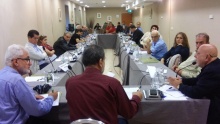1. To find a national, reasonable political solution to the Syrian conflict.
2. To follow up on the points that were agreed upon at the first conference in Schlaining in March 2014, to examine their validity, and to present a practical plan for the continuation of the peace process in Syria.
3. To discuss the plan to hold a national, all-encompassing conference of all Syrian political forces in Damascus or somewhere in Syria.
The two-days discussions were characterized by a seriousness and a spirit of responsibility, despite of some mutual accusations between the different groups who blamed each other for prolonging the war. Nonetheless, the determination of the participants to reach an agreement on some common points prompted them to identify the points of agreement, and to exclude points of dispute from the discussion. After lengthy discussions some practical steps were agreed upon. The most important are:
1. To establish “Houses of Peace” in Syria, starting with Damascus and expanding to other areas with the aim of enhancing a culture of peace.
2. To work on creating various parallel contexts in order to facilitate launching a political process to find a way out of the current crisis.
3. To work for an all-encompassing and comprehensive Syrian national conference to help the political process and put an end to the catastrophe.
Additionally, some points were discussed and some suggestions were presented and accepted by the participants. These are:
1. The formation of an advocacy group to exercise pressure on Syrian political parties and influential international circles.
2. Networking and linking with all groups of Syrian and international institutions involved in working on the peace process.
3. The selection of internationally renowned figures of an international impact to act as goodwill envoys and mediators.
4. Sending three people from the International Initiative www.peaceinsyria.org to meet different parties in order to urge them to work on the peace process and be part of the Syrian national all-encompassing conference in Damascus or somewhere in Syria.
After establishing some of the practical points which the two sides agreed to work on, the participants established further three major points:
1. To stop the violence and killings by launching a negotiated political process in Syria as the only safe solution and to release all prisoners and hostages and ensure the return of refugees and displaced people.
2. To maintain the unity of the Syrian State and its sovereignty.
3. To promote a culture of peace and to coalesce forces against violence and sectarianism in one front.
At the end of the meeting, the International Initiative for Peace in Syria expressed its willingness to provide all possible facilities to serve peace in Syria and to prompt all sides to sit on one table for a political process that can save Syria from the ongoing crisis and put an end to the devastating war.
Participants:
1) Abdulmanem Harah, Humanitarian worker, Aleppo
2) Aliaa Al Mustafa, educational expert, Damascus
3) Aref Dalila, former dean of the Damascus faculty of economics, Lattakia
4) Ayman Quhuf, editor-in-chief syriandays.net, Homs
5) Bashir Yahia, independent Islamic scholar, Idlib
6) Elias Samo, university professor, Aleppo
7) Faek Hwaje, lawyer, Salamia
8) Fateh Jamous, Coalition for Peaceful Change, Lattakia
9) Hassan al Hashemi, Political secretary of the Muslim Brotherhood, Aleppo
10) Hend Mujali, women’s activist, Deraa
11) Mohamed Habash, independent Islamic scholar, Damascus
12) Monzer Halloum, university professor and journalist, Lattakia
13) Mouna Ghanem, medical doctor, leading member “Building the Syrian State”, Damascus
14) Naser Al Ghazali, human rights activist, Deraa
15) Nidal Al Chaar, minister of economy and trade 2011-12, Aleppo
16) Riad Drar, independent Islamic scholar, member “Hayat al Tansiq”, Deir ez-Zor
17) Samir Aboullaban, member political bureau Muslim Brotherhood, Homs
18) Shereen Abdi, member PYD, Kobane
19) Waseem Haddad, religious scholar, Tartous
20) Yara Farees, activist, Damascus

